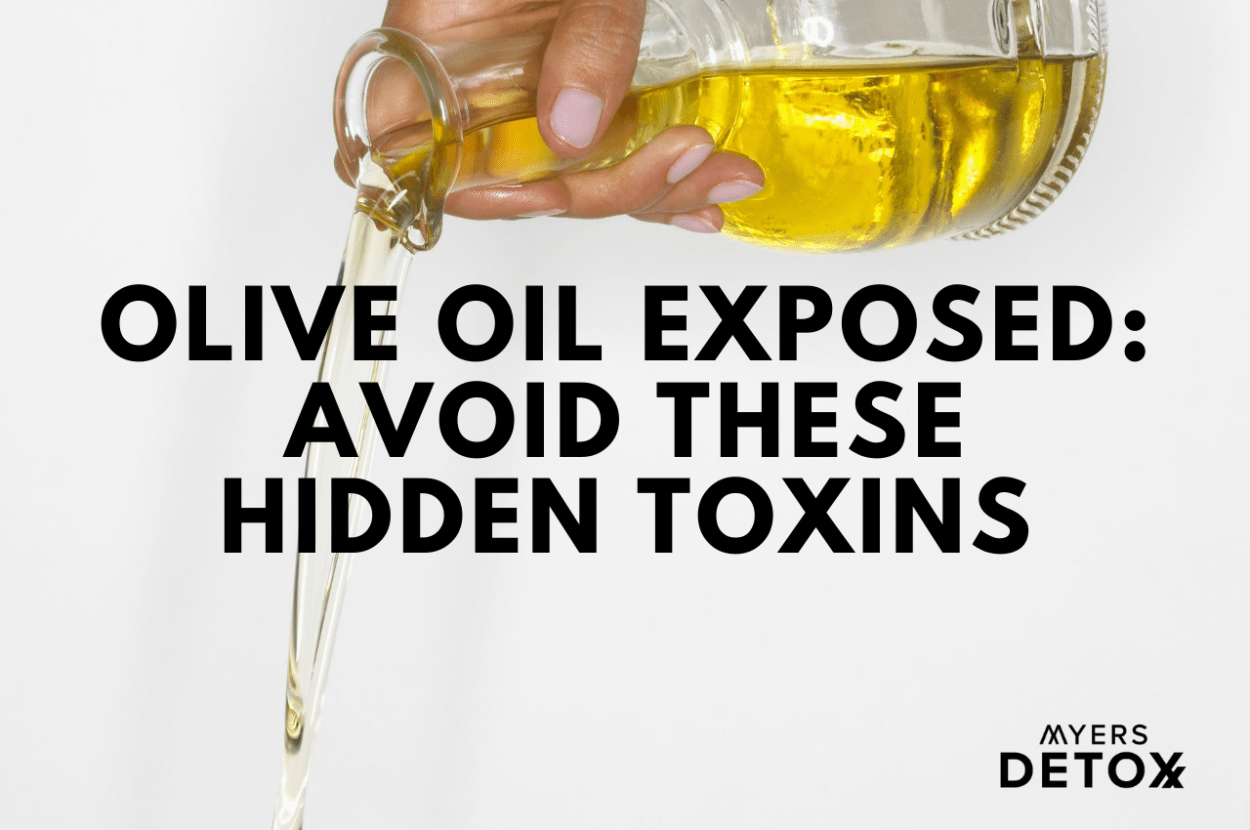Toxins in olive oil?!
Olive oil is well-known for its myriad of health benefits. This flavorful source of fat is the cornerstone of the Mediterranean diet, and it comes packed with health-promoting compounds like monounsaturated fats and antioxidants.
But there’s a dark side to olive oil that many people are unaware of. This food product that typically gets a health halo needs much more scrutiny than we’ve been giving it, and unless you know what to look for, your olive oil could be slowly damaging your health. Read more on the hidden toxins in olive oil…
In this article, you’ll learn:
- The secrets the olive oil industry doesn’t want you to know
- The hidden toxins in your olive oil
- Tips for purchasing high-quality olive oil
- The only olive oil I trust
Four Primary Issues With Olive Oil
Olive oil is known as a health-promoting food, but before you give the oil on your counter a green light, there are a few things you need to be aware of.
#1. Incorrect Labeling
The world of olive oil labeling is like the Wild West — there truly is no authority. In fact, books have been written on the subject, revealing that many of the olive oils you see on the shelves labeled “Extra Virgin” are, in fact, nothing of the sort.
#2. Oils Cut With Other Oils
Some growers will cut their olive oil with cheaper oils like soybean or sunflower oil. This provides a larger yield for them, and they still get to charge olive oil prices. Unfortunately, the FDA doesn’t do a great job regulating this, so it happens more frequently than you might think. The FDA has bigger fish to fry that fake olive oil.
#3 Chemical Refinement
Lower quality oils will go through chemical refinement like bleaching or deodorizing or chemical solvent extraction of the olives. This makes the oil look clearer and is meant to take out natural impurities, but it destroys some of the delicate health-promoting compounds that give olive oil its amazing health benefits.
#4 Toxic Contaminants
Like any other crop out there, olive oil is subject to contaminants from the growing process, manufacturing process, and naturally-occurring contaminants that can develop over time.
Hidden chemicals in your olive oil not only supersede the health benefits but may be causing you serious harm over the long haul.
Toxins In Olive Oil
Below are five of the most common chemical toxins that could be hiding in your olive oil.
#1 Pesticides
It’s no secret that pesticides are used to grow conventional produce. With that being said, many people overlook the use of pesticides in products like olive oil. Unfortunately, many olive oil growers use pesticides to enhance their yield, and those pesticides end up in the oil that you drizzle over your home-cooked meals[1].
Pesticides most often affect your nervous system, showing up as symptoms like[2]:
- Dizziness
- Fatigue
- Restlessness
- Nervousness
- Mood changes
- Hormone imbalance
- Insomnia
- Mental confusion
#2 Mycotoxins
Mycotoxins are naturally occurring toxic compounds that are produced by some molds. You may have heard of aflatoxin, a type of mycotoxin commonly found in peanuts. Aflatoxins are amongst the most poisonous types of mycotoxins — and they can also be found in olive oil[3].
Typically, olives become contaminated with mold and aflatoxin after being stored for long periods of time. This underscores the importance of using only the freshest possible olive oil to avoid potential poisoning by mycotoxins.
Aflatoxins target your liver and are known to be genotoxic, causing damage to your DNA. In short, these toxins should be avoided at all costs[4].
#3 Polychlorinated Biphenyls (PCBs)
PCBs are a group of manmade chemicals that are now banned due to their detrimental health implications but were once widely used in commercial and industrial applications.
Although these harmful chemicals are no longer being manufactured, we still experience the fallout of their toxic nature due to a large amount of PBCs that have ended up in our environment. You can find PBCs cycling through the air, water, and soil — contaminating not only agricultural crops like olives, but the water supply as well[5][1].
#4 Polycyclic Aromatic Hydrocarbons (PAHs)
PAHs are naturally occurring chemicals that can be formed during the production of olive oil when it’s heated[6]. The most significant threat to human health that PAHs pose is as a carcinogen. However, these compounds may also affect your pulmonary system, digestive system, and kidneys[7].
#5 Phthalates
Phthalates are a group of chemicals used as plasticizers and additives in food packaging materials. These compounds typically end up in your body by leaching into your food from the container or packaging carrying them. In the case of olive oil, avoiding plastic bottles is crucial if you want to spare your body the detrimental effects of phthalates[8]
Phthalates are particularly dangerous for males, affecting their productive health by lowering testosterone and causing abnormalities in sperm production. However, women should also be warned that prenatal exposure to phthalates may result in hormonal issues, cognitive issues like lower IQ and problems with hyperactivity in children[9].
Tips For Buying Olive Oil
The truth may be startling, but it’s far better to be informed than to be in the dark when it comes to the potential health threats lurking in your food. That includes avoiding hidden toxins in olive oil!
Does this mean that olive oil is off the table? No way. There are plenty of growers out there that are doing their best to bring you high-quality olive oil that’s rich in nutrients and flavor. Your job is to be discerning and know what to look for before you purchase.
Here are five things to look for when you’re buying olive oil:
#1 Harvest Date
Freshness is key to olive oil. The longer an oil sits, the more likely it is to lose its nutrition and become oxidized or rancid, which will cause inflammation and cell damage. Furthermore, if olives are harvested and sit around for a while, the likelihood of aflatoxin increases significantly.
For the freshest and most health-promoting olive oil, forget the “best by” date, and check the bottle for a harvest date. You want to begin consuming an olive oil within 6 months of the harvest date.
If the bottle of olive oil you’re eyeing doesn’t have a harvest date — move on, that producer is hiding that information for a reason.
#2 Dark Glass Bottle
Avoid olive oil in clear bottles. Light causes delicate oils in olive oil to oxidize and go rancid. A dark glass will block out light and sunlight that can potentially oxidize your oil.
#3 Organic
An organic label is a simple way to ensure that there are no pesticides or solvents hiding in your delicious olive oil. An olive oil made in the US should warrant a USDA organic label.
However, most olive oil is made in other parts of the world who don’t seek out a USDA organic label even if they meet organic standards and beyond. So this label is not always required.
What you do need to know is simply if the farm where you purchased your oil is not using pesticides and using organic farming practices. That will suffice. But you want to buy from a farm you know or a store or company you trust that buys from farms that use natural, organic standards from soil to sealed bottle.
#4 Certified Extra Virgin
Always look for certified extra virgin olive oil. There are a lot of sneaky terms that manufacturers can use like “pure” “cold-pressed”; these are marketing terms and really don’t mean anything when it comes to quality.
Extra virgin is the very first press of an oil. It’s the most nutritious. And the oil must pass quality tests for taste, color and other measures to achieve this grade and label.
Avoid the terms “virgin” olive oil, “light” olive oil, “cold-pressed” only on the label and nothing else and simply “olive oil”.
#5 Estate Names
When perusing the back of your bottle, see if you can find an estate name. This gives you information about where your oil was grown, and many smaller olive oil farmers will have the estate name right on the packaging.
My Number One Choice For Olive Oil
When it comes to olive oil, freshness is key. A fresh oil not only provides better flavor, but it also ensures that the health-promoting compounds like healthy fats and antioxidants are still present in the oil and the oil hasn’t gone rancid.
Even the most high-quality growing conditions can produce a low-grade olive oil if the time from harvest to your dinner table is lagging.
Once I learned about olive oil and how crucial it was to source fresh olive oil and it be grown and harvested and processed in a certain way, it became my mission to find the highest-quality, freshest oil in the market. This, of course, led to hours of reading labels and frankly quite a bit of frustration.
I used to buy California olive oils, but even these are only good to eat once per year for a few months. They can only harvest once per year. I’d see olive oils at my farmer’s market, but they’d be in clear bottles and I had no idea if they were really grown and processed with the highest standards.
That’s why I was so excited when I found the Fresh-Pressed Olive Oil Club. This club provides independently lab-tested and certified olive oils that are 100% pure. Listen to a podcast with the “Olive Oil Hunter” and founder of the Fresh-Pressed Olive Oils Club, TJ Robinson here.
They check all the boxes when it comes to olive oil quality, organic standards, olives harvested at the peak of ripeness, stored correctly, pressed correctly and stored correctly. There’s a lot that can go wrong from soil to seal!
Fresh-Pressed Olive Oil Club oils are grown by award winning traditional passionate olive oil farmers in Italy, Spain, Argentina, Chile Australia and other parts of the globe.
I’ve been a member of the Fresh-Pressed Olive oil club for two years. I LOVE their olive oil. I have never found better tasting olive oils. And I can trust that each bottle is fresh and meets all of my high standards when it comes to food.
These are not the oils that you’ll find on the shelves of your local grocery store. In fact, these oils don’t sit on shelves anywhere. The Fresh-Pressed Olive Oil Club ensures that you get the freshest oils because they’re shipped directly to you via jet post-harvest — it doesn’t get fresher than that!











